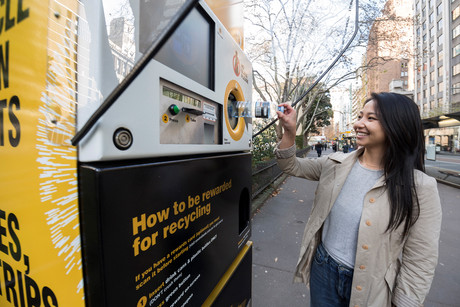Cashing in on CDS: Aussie businesses reaping the rewards

We all know that recycling is better for the environment, but what many Australian organisations may not yet realise is that it’s also better for business.
Corporate sustainability has become more than a buzzword — shareholders, customers and staff now expect companies to exhibit transparent and measurable actions that alleviate a drain on the Earth’s resources.
Some of these are already deeply ingrained in the corporate landscape. Many focus on behavioural change at an individual level, such as email signatures reminding recipients to think before they print and workplace signage that highlights the impact of paper and energy usage choices. At an enterprise level, supplier relationships are now frequently based on the green credentials of potential vendors and their ability to deliver a more environmentally responsible version of a product or service.
Australian businesses are increasingly looking for additional ways to meet their sustainability goals. What they are also discovering is that the choices they make can have a significant positive impact on their bottom line.
Container deposit schemes — a golden opportunity
The imminent introduction of container deposit schemes (CDS) — due in NSW in December 2017, with Queensland and Western Australia following in July 2018 — presents a great opportunity for business to get on board.
The CDS introduction will align these states with the Northern Territory and South Australia, where similar programs have been successfully operating for years. We know that financial incentives have a marked influence on recycling behaviour — recovery rates for approved containers in SA and the NT consistently outstrip the rest of the country.
An increasing number of savvy businesses are seeing the potential that the impending CDS launches present. Installing an on-premise waste recovery solution makes companies an integral part of a solution that pays users for the good that they do; recycling that pays in a multitude of ways — people, the planet and profits.
In states and territories with an established CDS in place, registered customers return bottles and cans at reverse vending machines (RVMs) and depots to receive their cash deposit. Even in locations where the scheme isn’t planned or hasn’t commenced, these same facilities offer a range of other incentives including movie tickets and gift vouchers, as well as the option of donating to charities and other non-profit organisations.
Of course, there is more at stake than purely financial incentives. A convenient, clean, fast and efficient way of recycling is the key to improving overall resource recovery rates and minimising waste.
How does it pay?
While it’s increasingly important for companies to be green, there are a number of additional benefits associated with installing an on-premise recycling facility.
In the case of retail environments, offering a means of fast, clean and efficient recycling immediately makes that site a community service destination, leading to increased foot traffic, broader exposure and the potential additional revenue this presents, thanks to an increase in potential shoppers. It’s simple — more people means more opportunity for sales.
The provision of a facility for recycling also delivers increased community engagement, as staff, clients and the wider population can see a concerted corporate commitment to diverting waste from landfill and reducing litter. Recycling solutions can be configured to provide an avenue for donations to charities and other not-for-profit organisations, demonstrating a social conscience and enabling the community to ‘lend a hand’ through everyday actions that would otherwise have no discernible impact.
Recycling station sites have access to comprehensive data and reporting specific to each location via a web-based portal. An easy-to-read dashboard gives an immediate overview on things like the number of containers recycled, the value of coupons redeemed and other important comparative information including energy savings achieved thanks to recycling efforts, simplifying corporate sustainability reporting.
Once the CDS is up and running in NSW, the Environmental Protection Agency (EPA) will release an interactive map showing collection points across the state, making it easy for consumers to identify the nearest depot or RVM.
The broad introduction of CDS programs is such a positive for our environment and smart businesses are shaping up to take advantage.
Healthcare waste recycling initiative to repurpose IV bags
New Zealand's Southern Cross Healthcare has embraced a recycling initiative in which its IV...
Tackling plastic waste in health care
With the support of APR Plastics, Recycle Wise has initiated a service previously missing in the...
How the perfect blend of tyres and plastic led to a sulfur-free oil
When tyres are broken down, the oil formed normally contains hazardous sulfur-containing...











